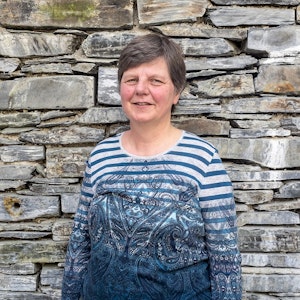
Dr Frances Hill
Senior Lecturer and SEPDM Programme Leader
With a background in physics, and a PhD in Environmental Engineering, Frances lectures on heat transfers in buildings, and on renewable energy provision. She also teaches study skills including data analysis.
Frances Hill is a lecturer/tutor on the MSc Sustainability & Adaptation on-site course. With a background in physics, she lectures on heat transfers in buildings, heating, cooling and ventilation, and lighting, and runs practicals on solar water heating, carbon calculators, and energy modelling.
Frances holds a PhD in Environmental Engineering at Manchester University. Her research focused on how energy is used in a supermarket as a building, and on how Building Regulations could be changed to reduce this level of use. Alongside this, she has been involved in projects looking at how engineers learn, with particular focus on Problem Based Learning.
Qualifications
PhD Environmental Engineering, Manchester University
MSc Architecture: Advanced Environmental and Energy Studies, University of East London
Teaching activities
Lecturer
Seminar and practical studies tutor
Thesis supervisor
Research Interests
Energy use reduction for new-build commercial buildings
Microgeneration
Modelling to assess impacts of previously unexamined variables
Publications
Optimizing WWR for conserving energy in office buildings for cooling dominant climates with and without daylight utilization, Altaf M, Hill F, 2017, International Conference for Sustainable Design of the Built Environment – SDBE London 2017 pp538-549
Investigation of strategies for optimal retrofitting of London Victorian houses to prevent overheating, Zahan A-E, Hill F, International Conference for Sustainable Design of the Built Environment – SDBE London 2017 pp574-585
Thermal bridging through timber elements of strawbale construction: exploring its extent, with particular reference to self-build projects, Butler J, Hill F, 2017, International Conference for Sustainable Design of the Built Environment – SDBE London 2017 pp 1148-1159
Do small scale green spaces function as “cool islands” within the urban heat island? Characteristics and performance of selected green spaces in central London, 2017, Hanrahan A, Hill F, Conference Proceedings: Passive and Low Energy Architecture, 2017, Edinburgh
The impacts of climate change on UK energy demand, Wood FR, Calverley D, Glynn S, Mander S, Walsh C, Kuriakose J, Hill F, Roeder M, Infrastructure Asset Management Volume 2 Issue 3, 2015, pp. 107-119 ISSN 2053-0242 | E-ISSN 2053-0250
Learning style preferences: an examination of differences amongst students with different disciplinary backgrounds, Hill, Tomkinson, Hiley, Innovations in Education, Taylor and Francis 2016, 53:2 https://doi.org/10.1080/14703297.2014.961504
Developing figures for ‘gain’ in relation to refrigerated cabinets in a supermarket building, Hill, Watkins, Edwards, Building Services Engineering Research and Technology, 2014 vol. 35 no. 5 465-474 DOI: 0143624413510165
Influence of display cabinet cooling on performance of supermarket buildings, Hill, Edwards, Levermore, Building Services Engineering Research and Technology, 2014 vol. 35 no. 2 170-181 DOI: 0143624413478955
2013, Embedding Employability: Does it work?, Hill, Tomkinson, Hiley, Educational Developments, 14.2, June 2013, SEDA, London
Process energy in supermarket design compliance: modelling stratification to interrogate the Gap, Hill, Edwards, Chartered Institute of Building Services Engineers Technical Symposium, Liverpool, 11-12 April 2013
Identification of changes needed in supermarket design for energy demand, Hill, Edwards, Levermore, International Conference for Enhanced Building Operation, Manchester, October 2012
Consumer Impacts on Dividends from Solar Water Heating, Hill, Levermore, Lynch, Energy Efficiency 2011 4:1-8, Springer, DOI: 10.1007/s12053-010-9086-2
Towards a zero energy store – a scoping study (ZEST), Hill, Courtney, Levermore, 2010, Sustainable Consumption Institute, University of Manchester, UK
Micro-generation from renewable and other sources; Staffell et al, 2009, UKERC
Maximising energy savings from domestic microgeneration: a cultural and behavioural analysis; Bergman et al, 2009, Environmental Change Institute, University of Oxford
